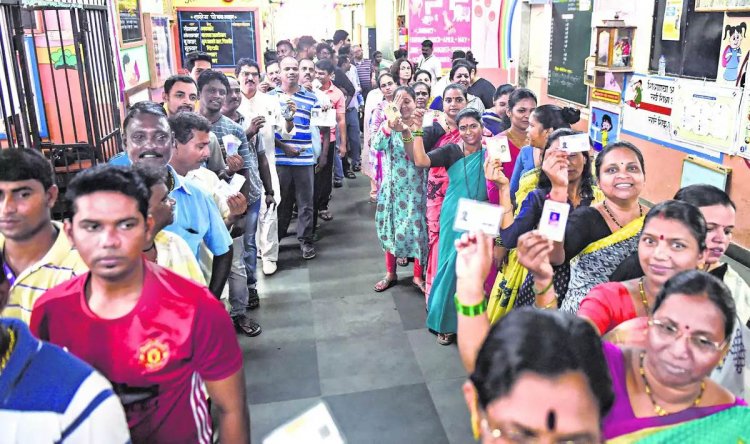Making the South Politically Irrelevant Through Population Driven Delimitation
Asia News Agency

The inauguration of the new Parliament building on 28 May was a momentous occasion for the republic. PM Modi mentioned that the larger Parliament building is capable of accommodating 888 members in the Lok Sabha and 384 in the Rajya Sabha. In what could decidedly alter the nation’s political landscape, writes Anand Kochukudy (Kerala-based journalist and columnist) “PM Modi’s allusion to increased representation presages the delimitation of parliamentary constituencies in 2026.”
Delimitation of parliamentary constituencies: advantage BJP
Seats in the Lok Sabha had increased from the 1951-52 general elections right until the 1971 polls, in accordance with the constitutional provision of allocating seats on the basis population. With the enactment of the 42nd amendment of the Constitution in 1976, the delimitation process was frozen for 25 years, which, in 2001, was pushed back by another 25 years with the 84th amendment.
If BJP retains power in the 2024 Lok Sabha elections, Kochukudy states “it will start at a huge advantage in the polls down the line, as delimitation will follow in 2026.”
That is simply for example, “because the number of seats in the Hindi heartland, where BJP won 60% of its seats in 2019, would see an exponential rise, with one projection estimating that Uttar Pradesh alone would have 143 seats while Kerala’s tally would remain intact at 20. In the last 50 years, where the southern states have seen a plateauing population, heartland states have fared abysmally on this count.”
Southern States with better population control strategies at a disadvantage
A precursor to the delimitation exercise and how it could affect the southern states disproportionately “became apparent in the 15th finance commission’s (finance commissions are periodically constituted to define the financial relations between the central and the individual state governments) devolution to these states. This was set in motion by the Modi government’s terms of reference to the commission…… it mandated that the census data of 2011 be used to arrive at the figures instead of the 1971 numbers used until then.”
Needless to say, writes Kochukudy “this saw the southern states losing their share by 1.96 per cent, benefitting the Hindi-belt states.
“The whole rationale of a freeze in constituency delimitation in 1976 was guided by the sound logic that population control initiatives (better in South Indian states) would require a fair amount of time to take effect. With the resultant skewed fertility rate among states, the moment delimitation is taken up, it would surely set the stage for a massive showdown, with southern states slated to be the biggest losers in terms of representation.
“It would be akin to punishing the South simply on account of its success in implementing population control measures, in line with central government policy, and conversely, rewarding the states that bungled on it.”
Salem Dharanidharan (spokesperson for the Dravida Munnetra Kazhagam (DMK) and a Co-Founder of the Oxford Policy Advisory Group) and Brian Wong (Rhodes Scholar and DPhil in Politics candidate at Balliol College, University of Oxford, and a Co-Founder of the Oxford Policy Advisory Group) explain the same point more elaborately.
The Delimitation Commission of India possesses two critical functions. The first constitutes determining boundaries of Assembly and Lok Sabha constituencies based on census data. The second requires that the number of Lok Sabha seats per state is recalibrated after each census in accordance with the population numbers and ratios of all states.
Therefore, write Dharanidharan and Wong “any upcoming delimitation would have very real and significant implications for all states in the country. Prudence and pragmatism are needed in ensuring that the changes reflect the holistic democratic interests of the country.
Impact of delimitation on ground
A genuine concern of Delimitation is the principle of fair play. Population estimates “suggest that the new delimitation would give rise to 222 seats for Uttar Pradesh and Bihar (as compared with 120 at present), 165 for the five Southern States (129 at present). The net result is a substantial reduction in the proportion of seats for states that have adopted more proactive measures in restraining population growth over the past decades.
“To put this into further perspective, the proportion of seats accorded to states where the BJP is dominant may increase from 40% at present to about 51%, whilst reducing the percentage of MPs in the South from 25% to 18%.”
The two authors state while “the level of support the Bharatiya Janata Party (BJP) has enjoyed across vast swathes of the Indian demographic should be acknowledged as valid and significant, yet such support must also be balanced against the interests, preferences, and values of states that are not conventional BJP strongholds. Both the North and the South matter. Robust regional representation is crucial for long-term political stability.”
BJP’s goal to maximise its tally from the South
For now however, BJP’s eyes are firmly trained on the impending Lok Sabha election next year. With its seats in the Hindi heartland reaching a saturation point in 2019, the focus is on maximising its tally from the south.
The use of ‘Sengol’ (used extensively in Tamil Nadu, historically) in ths opening of the new parliament, is part of “BJP’s grand idea to awaken Hindu consciousness among Tamils. BJP is simultaneously trying to cater to the Shaivites in Tamil Nadu, similar to the Lingayats in Karnataka, to bolster its Tamil-Brahmin base in the state.
“Likewise, the party continues to court the Church in Kerala, harbours ambitions of emerging as the primary opposition in Telangana, and mulls forming a tri-party alliance in Andhra Pradesh in the run-up to the 2024 Lok Sabha polls. The setback in the Karnataka election has put a spanner in this blueprint, for now.”
The point is that “if BJP cannot start winning there, it will make southern states irrelevant to its election matrix by undertaking delimitation of constituencies by 2026 itself.”















